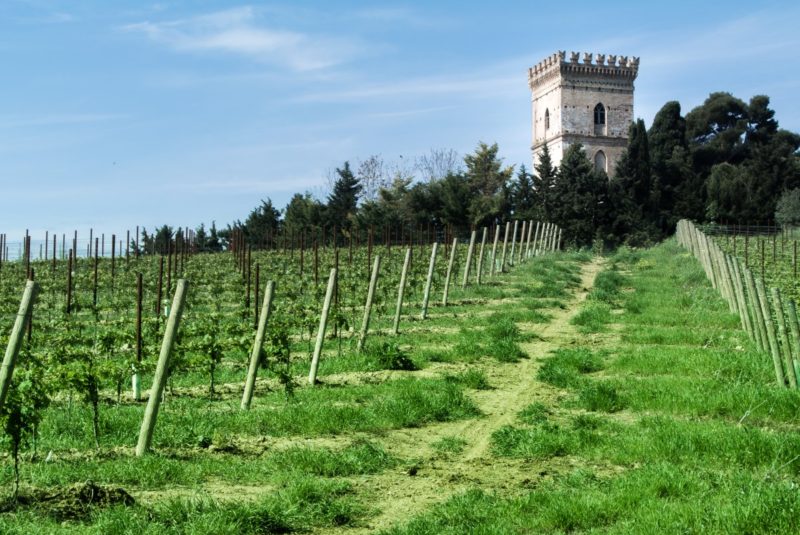God invented capital
Mark 12:1-12 is a parable about accountability, theft and judgment. It also reveals something about resources.
 And he began to speak to them in parables. “A man planted a vineyard and put a fence around it and dug a pit for the winepress and built a tower, and leased it to tenants and went into another country. When the season came, he sent a servant to the tenants to get from them some of the fruit of the vineyard. And they took him and beat him and sent him away empty-handed. Again he sent to them another servant, and they struck him on the head and treated him shamefully. And he sent another, and him they killed. And so with many others: some they beat, and some they killed. He had still one other, a beloved son. Finally he sent him to them, saying, ‘They will respect my son.’ But those tenants said to one another, ‘This is the heir. Come, let us kill him, and the inheritance will be ours.’ And they took him and killed him and threw him out of the vineyard. What will the owner of the vineyard do? He will come and destroy the tenants and give the vineyard to others. Have you not read this Scripture:
And he began to speak to them in parables. “A man planted a vineyard and put a fence around it and dug a pit for the winepress and built a tower, and leased it to tenants and went into another country. When the season came, he sent a servant to the tenants to get from them some of the fruit of the vineyard. And they took him and beat him and sent him away empty-handed. Again he sent to them another servant, and they struck him on the head and treated him shamefully. And he sent another, and him they killed. And so with many others: some they beat, and some they killed. He had still one other, a beloved son. Finally he sent him to them, saying, ‘They will respect my son.’ But those tenants said to one another, ‘This is the heir. Come, let us kill him, and the inheritance will be ours.’ And they took him and killed him and threw him out of the vineyard. What will the owner of the vineyard do? He will come and destroy the tenants and give the vineyard to others. Have you not read this Scripture:
“The stone that the builders rejected
has become the cornerstone;
this was the Lord’s doing,
and it is marvelous in our eyes”?
And they were seeking to arrest him but feared the people, for they perceived that he had told the parable against them. So they left him and went away.
Every period of history has witnessed disputes between a distant landlord and his tenants. Jesus builds a parable around this common occurrence to teach about God’s judgment.
The secondary significance of the parable
The parable is a story of murder and theft by the tenants of the vineyard and the judgment of God on those tenants, who represent Israel’s leaders. God’s people are expected to produce good fruit, to be a blessing to all the nations of the earth (Genesis 12:2-3). But instead, Israel hoards the fruits of the blessing for herself. She beats the prophets, kills the Messiah, and throws his body out of the vineyard. The landlord judges the tenants and gives the care of the vineyard to others who will give him his due.
Most Christians are familiar with the parable and its primary meaning. But recently I have been reflecting on another lesson here, one badly needed today. It has to do with the nature of capital.
The term capital “made its first appearance in medieval Latin as an adjective capitalis (from caput, head).” In architecture it was used as the -“head of a column or pillar.” In economics, from the 1640s it was used for “the wealth employed in carrying on a particular business. ”
Webster, in his 1828 Dictionary of American English, defines capital first in the adjective form, “literally, pertaining to the head, and figuratively, as the head is the highest part of a man, chief; principal; first in importance; as a capital city or town; the capital articles of religion.” Webster defines the noun, “The uppermost part of a column, pillar or pilaster, serving as the head or crowning, and placed immediately over the shaft, and under the entablature,” and finally as “capital stock, the sum of money or stock which a merchant, banker or manufacturer employs in his business.”
Capital includes much more than merely money
The root word for capital is the Latin caput (not to be confused with the better-known slang term, kaput, meaning ruined; done for; demolished). This means more than financial capital. We must move beyond the narrow thinking that capital is only about money. Both communism and most forms of so-called capitalism (hedonistic capitalism, consumer capitalism and crony capitalism) define economics in merely material terms. Many forms of capital are needed for comprehensive development.
– Metaphysical capital – worldview
– Moral capital – to do the right and just thing
– Physical (natural) capital – the natural resources “in the ground”
– Social capital – familial and community relationships
– Institutional capital – hospitals, schools, legal systems, libraries
– Spiritual capital – the gifts and fruit of the Spirit
– Infrastructure capital –power grid, communications network, roads and bridges,
The rest of this article will deal with the first two items, metaphysical capital and moral capital.
Metaphysical capital: the Creator is the archetype of CAPUT
We may speak of caput as the capital from the head, from the mind. This may be called metaphysical capital or worldview.
In Genesis 1, God reveals that he spoke creation into existence. Here is the archetypical example of caput. Before the physical universe existed, the eternal God existed. It was the community of the invisible Intelligent Designer who brought the visible universe and life into existence from the heart of His transcendent existence by:
– Forming an intention – Conceiving – Father
– Articulating the intention – Speaking – Son
– Actualizing the intention – Willing – Holy Spirit
The mind of God shows the transformative power of caput. The psalmist captures this in Psalm 33:9: “For He spoke, and it came to be; he commanded and it stood firm.” This is the ultimate manifestation of caput. The writer of the book of Hebrews captures the same thing in Hebrews 11:3: “By faith we understand that the universe was formed at God’s command, so that what is seen was not made out of what was visible.” The invisible God created the visible universe.
Again, God’s acts of creation comprise the manifestation of caput. The ultimate capital is not physical but metaphysical, a capital that can conceive of something new, can envision that new thing and then actualize its creation through shaping material capital.
We see this envisioning (an action of the mind) and actualizing (an action of the hands) in the parable. The landlord capitalized the vineyard for those who would tend it. Preparing a barren, untended land to be productive requires several steps. Jesus mentions some, and some he leaves unspoken.
Development requires the mind and the hands
The first (unmentioned) steps were in the mind of the landlord.
– He imagined the transformation of the land from a barren place to a fruitful vineyard.
– He planned the steps needed for the transformation of the land.
This mental work was followed by manual work, implementing the plans to turn the thing imagined into reality. The landlord
– Cleared the land,
– Planted the vines,
– Built the wall,
– Dug a pit,
– Built a winepress, and
– Erected a tower.
What are the economic principles of the parable? The landowner expected a just return on his capital investment. The tenants deserved a just return for their labor in caring for the vineyard and making it productive.
– Darrow Miller
… to be continued
[1]As in other Old Testament texts, Israel is symbolized by a vineyard.
– Psalm 80:8-9,16 – God takes the vine out of Egypt, prepares the soil and plants a vineyard
– Isaiah 5:1-5: – The song of the vineyard
– Jeremiah 2:21 – Israel was a choice vine of “sound and reliable” stock
– Jeremiah 12:10 – The shepherds are unreliable and will trample the vineyard
– Ezekiel 15 – Jerusalem is an unproductive vine
– Hosea 10:1 – Israel was a spreading vine that bore fruit for himself not for the one who had planted her.
[2] Not to be confused with the better-known slang term, kaput, meaning ruined; done for; demolished.








